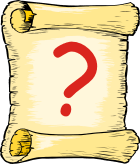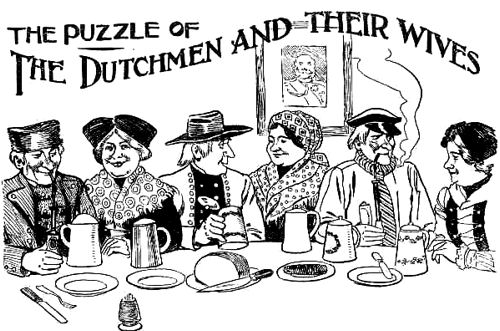



SOME OF THE OLD Dutch customs are yet preserved of trading cattle, poultry and farm products in odd numbers and quantities pertaining to each variety, such as to buy eggs by the score, some things by the dozen, others by bushel, peck or small measure, sugar by the three and half pounds, etc., etc.
This custom explains a curious old problem, published a couple of centuries ago in a unique collection of anecdotes of old Manhattan, with which many are familiar, but which for apparent lack of perspicuity has caused its meaning to be questioned.
In the language of this quaint old volume, it says: “There came three Dutchmen of my acquaintance to see me, who, being recently married, brought their wives with them. The men's names were Hendrick, Claas and Cornelius, the women's Geertring, Caterin and Anna, but I forgot the name of each man’s wife. Well, they told me that they had been to market buying hogs, each person buying as many hogs as they gave shillings for one hog. Hendrick bought 23 hogs more than Caterin, and Claas bought 11 more than Geertring. Likewise they said that each man laid out three guineas more than his wife. Now, what I want to know is whether it, is possible from this description of their purchases to tell the names of each man’s wife? "
The inference was that the merry party got so befuddled over their beer and schnapps that they could not tell just who was who, so the worthy landlord finds himself compelled to sort out the different couples properly, by a process of extracting the square roots of the hogs, the squares of the money and the squares of the men and their wives!
It is a curious problem which yields readily to experimental puzzle methods, so everyone is expected to solve it.
In the remarkable story of the three Dutchmen and their wives who came to town to buy hogs, it was told that each person bought as many hogs as they paid shillings per hog, and that each man spent three guineas more than his wife; likewise that Hendrick bought 23 more hogs that Caterin, and Claas bought 11 more than Geertring.
The puzzle was to pair the husbands and wives as proven by their purchases. It results in a curious complication of extracting the square roots of the pigs and wives which finally results in showing that Geertring bought 1 little pig for 1 shilling, and that her husband who must have been Cornelius taught 8 hogs for 8 shillings each. Caterin bought 9 for 9 shillings each, while her husband Claas bought 12 hogs for 12 shillings each. Anna bought 31 large hogs for 31 shillings each, while her good man Hendrick by name, taught 32 hogs at 32 shillings apiece.
2. Guessing-Match

A guessing-match about cats is entertaining. Write out the following list for each competitor without giving the answers, which are here printed in parentheses, and the ones guessing the largest number wins:
An aspiring cat (catamount),
A cat that can swim (catfish).
A cat that can fly (cat-bird).
A cat that will be a butterfly (caterpillar).
A cat's near relations (catkin).
A horned cat (cattle).
A cat that throws stones (catapult).
A tree cat (catalpa)
A water cat (cataract).
A cat that flavors the grapes (Catawba).
A cat that covers acres of grounds (cataclysm).
A subterranean cat (catacomb).
A cat that, living, appears dead (catalepsy).
A cat prised as a gem (cat's-eye).
A cat with a cold (catarrh).
A cat that is good to eat (catchup).
A cat that asks questions (catechism).
A library cat (catalogue).
A dangerous cat (catastrophe).
3.
Why would it be impossible to starve in the desert of Sahara? Because of the sand which is (sandwiches) there.
How did the sandwiches get there? When Ham was sent there with his followers, who were bred (bread) and mustered there.
Why can you never expect a fisherman so be generous? Because his business makes him sell fish.
Why was a defeated candidate after the last election, like the earth? Because he was flattened at, the poles.
[Page 91]